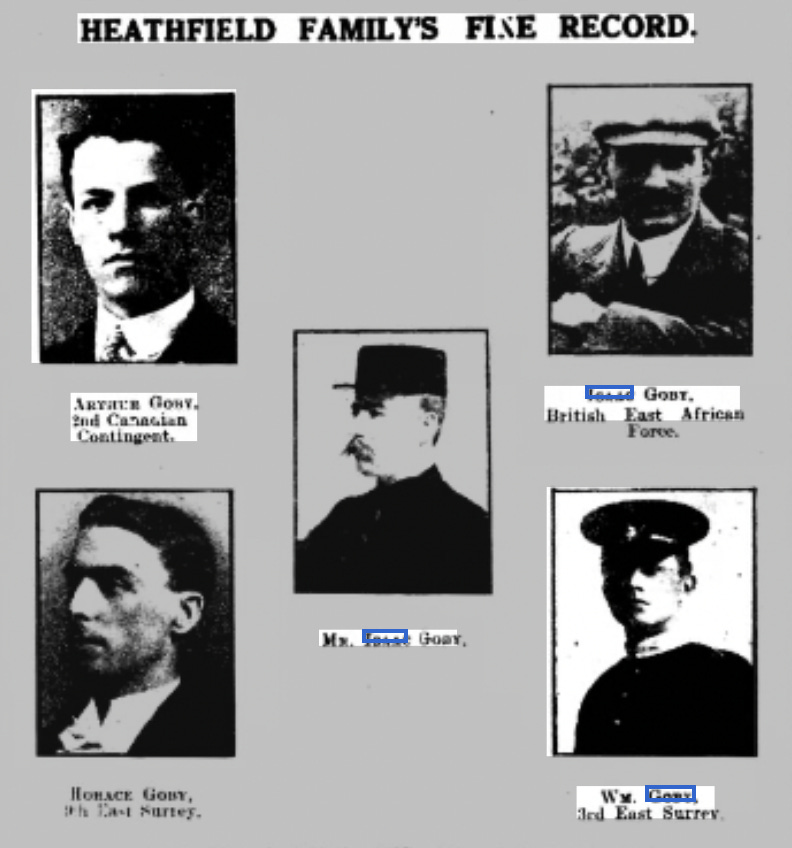A private detective's Great War loss
Isaac Goby was proud of his sons enlisting in World War 1; but his pride would turn to grief when not all of them came home...
Isaac Goby, in his police uniform, pictured in the 1914 newspaper
(British Library Board/British Newspaper Archive)
In December 1914, a Sussex newspaper included a story about one of its local residents - a man named Isaac Goby. Isaac, who had only moved to the county within the previous couple of years, after a lifetime in London, was even pictured. His picture gave away the fact that he had once been in the police - he was pictured in uniform, even though he had resigned over a decade earlier.
Around his photo were four more, each of a dashing young man - four of Isaac's sons. The article they illustrated was congratulating the Goby family's 'fine record' three months into the Great War; for these sons - Isaac Junior, William, Arthur and Horace - had enlisted to fight, along with a daughter's fiancé, and one of Isaac's cousins. Isaac was interviewed, saying if he was younger, he too would be "up and at 'em".
I suspect this was no idle comment. Isaac had served 25 years in the Met, followed by a spell as a private detective, and was used to a life of excitement, uncertainty and danger. He would not doubt have enlisted had he been young enough. At the time of this interview, however, he was approaching 60 years old, and it was now time for his sons to have their own excitement.
Isaac was born in Tendring, Essex, in 1859, and joined the police at Great Scotland Yard on 11 February 1878. While progressing up the career ladder to inspector, he married (Amy Phoebe Darling, in 1881) and had eleven children, their births echoing his work locations: Hampstead, Kensington, Beckenham, Hackney, Bethnal Green. Charlotte was the eldest, born in the winter of 1881, then Isaac, James, Amy, Margaret, William, Frederick, Alice, Arthur, Horace, and finally, Thomas, born in 1899. Isaac and Amy only lost one child in infancy - their second daughter, Amy, who died within months of her birth.
His police career is well documented, via his entry in the Metropolitan Police pension register, but his later career as a private detective less so. It's not clear how long he worked as such, outside of him describing himself this way in the 1911 census. There are no surviving adverts for his services as a private detective (although there is a mention in the Hackney Gazette of his retirement from the Met).
His mention in the 1914 Sussex article states that he was a former police inspector who spent eight years in London after leaving the force, and who then retired and moved to Sussex. This would suggest that Isaac, who left the force in 1903, could then feasibly have worked as a private detective up until just after the 1911 census was taken. At this point, he retired from all work and moved to Sussex with his wife and youngest children.
An artillery barrage on Allies trenches at Ypres, 1915
A quiet retirement was only possible for a few years, before war was declared. Isaac may have been proud of his sons for enlisting, but that did not guarantee their safety. Of the four sons who were eager to serve their country, only two of them would come home. William was killed in action at Ypres in April 1915, aged 25; his younger brother Horace died of wounds six months later, in Germany. Horace was only 18 years old.
The newspaper's coverage of the family made clear how war could disrupt an otherwise ordinary family. Before the war, Arthur Goby had been working as a clerk at a London tailor's; Horace had been a builder's clerk. William had been working for the same firm of electrical engineers since he was 14, only leaving to go and fight. The eldest son, Isaac, however, already had direct experience of war, and perhaps felt rather invincible: he had been part of the Boer War, going through 'several engagements' and coming out 'without a scratch'.
Both Isaac and Arthur Goby survived the war, but emigrated afterwards - to South Africa, in Isaac's case, and Canada in Arthur's (he would be joined by his sister Margaret by 1921). Another son, James, had joined the Shanghai Police at the age of 17, becoming a detective sergeant. His career was shorter than his father's, however, as he left after five years, later returning to China as a missionary. Youngest daughter Alice, who was mentioned in 1914 as being engaged to a 'young man who has joined the 3rd East Surrey regiment', married her young soldier in 1917 and lived until 1974.
But the Goby family's experience of war must have overshadowed the career of Isaac Goby, the police inspector turned private detective, for the remaining years of his life. He died in Sussex in 1943, in the midst of another war.





